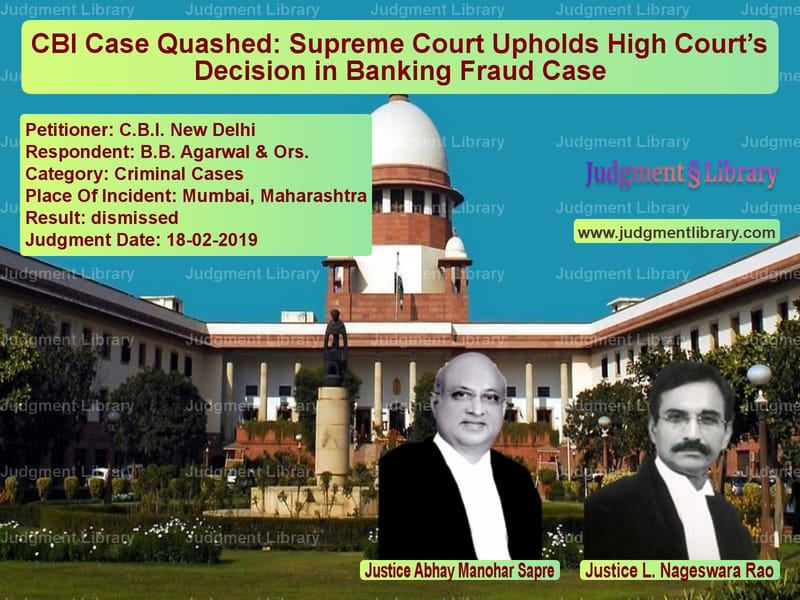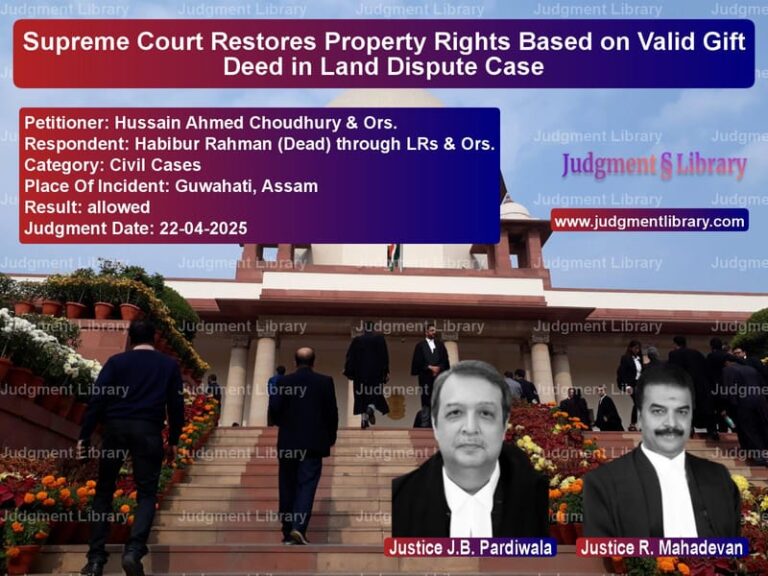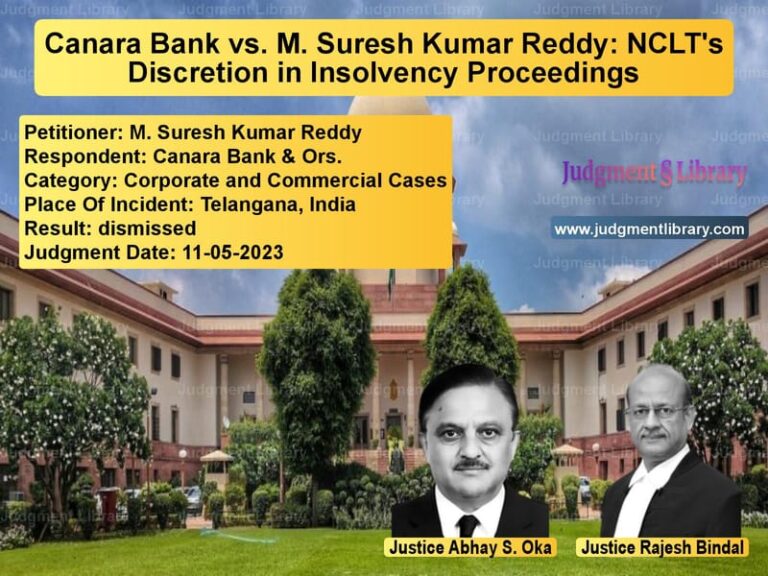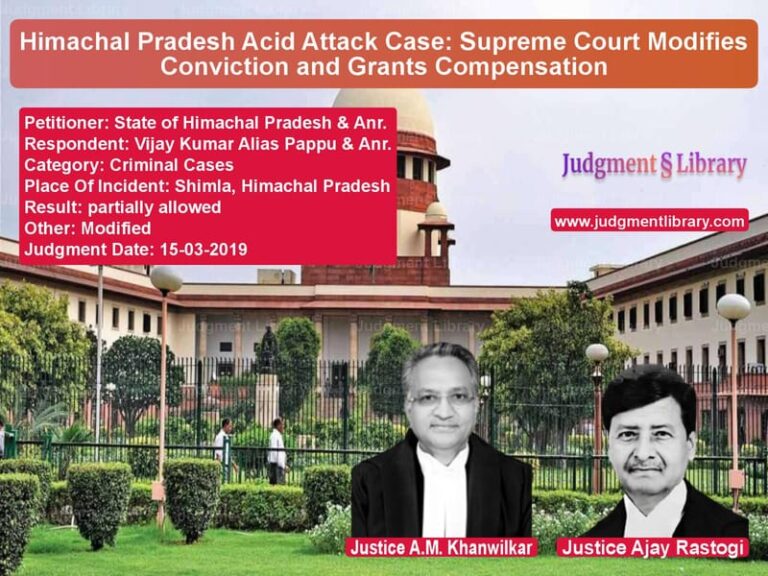CBI Case Quashed: Supreme Court Upholds High Court’s Decision in Banking Fraud Case
The case of C.B.I. New Delhi vs. B.B. Agarwal & Ors. is a significant judgment that deals with the legal impact of settlement agreements in financial fraud cases. The Supreme Court examined whether criminal proceedings could continue after a civil settlement between the accused and the aggrieved party. The Court ultimately upheld the Delhi High Court’s decision to quash the criminal case, reinforcing the principle that when there is no surviving element of criminality, prosecution serves no purpose.
Background of the Case
The case originated from an alleged banking fraud in the early 1990s. Two companies, M/s New Beam Ferro Alloys Ltd. (NBFAL) and M/s West Coast Brewers & Distillers Ltd. (WCBDL), were accused of defrauding Punjab National Bank (PNB), Mumbai, through fraudulent public issues. The companies allegedly obtained loans and financial assistance from PNB, misrepresenting their financial standing, causing a loss of approximately Rs. 15 crores to the bank.
The Central Bureau of Investigation (CBI) launched an investigation and filed a charge sheet against multiple individuals and companies, including bank officials, under various sections of the Indian Penal Code (IPC) and the Prevention of Corruption Act, 1988 (PC Act). The accused were charged under:
- Section 120B IPC (Criminal Conspiracy)
- Section 409 IPC (Criminal Breach of Trust by Public Servant or Banker)
- Section 420 IPC (Cheating and Dishonest Inducement of Delivery of Property)
- Section 468 IPC (Forgery for Purpose of Cheating)
- Section 471 IPC (Using Forged Documents as Genuine)
- Section 13(2) read with Section 13(1)(c) and (d) of the PC Act (Criminal Misconduct by a Public Servant)
By the time the case reached the courts, several of the accused had passed away, and two accused companies had been removed from the charge sheet.
Settlement with PNB
During the pendency of the criminal case, PNB initiated civil recovery proceedings against the companies before the Debt Recovery Tribunal (DRT), Mumbai. The companies and PNB eventually reached a One-Time Settlement (OTS) agreement, under which the accused companies agreed to pay Rs. 12.20 crores to settle their dues.
In light of the settlement, the companies and their directors approached the Delhi High Court under Section 482 of the Criminal Procedure Code (CrPC), seeking to quash the criminal proceedings. The High Court ruled in favor of the accused, stating that the core issue had been resolved through the civil settlement.
Petitioner’s Arguments
The CBI, representing the prosecution, argued:
- Financial fraud, especially involving public funds, is a serious offense that should not be quashed merely because of a civil settlement.
- The High Court had erroneously equated a financial settlement with exoneration from criminal liability.
- The accused had committed offenses against the public and not just PNB, warranting a full-fledged criminal trial.
- Even if PNB was no longer aggrieved, the state had an interest in ensuring accountability for banking fraud.
Respondent’s Arguments
The accused individuals and companies countered:
- The dispute was purely financial and had been resolved through the OTS settlement.
- Since PNB had accepted the settlement, there was no surviving complaint against the accused.
- The High Court correctly found that the criminal case served no further legal purpose.
- Prolonging the trial would be an abuse of process and an unnecessary burden on the judicial system.
Supreme Court’s Observations
The Supreme Court analyzed the legal principles governing the continuation of criminal proceedings after a civil settlement. The Court noted:
“When the primary dispute between the parties has been resolved, the courts must determine whether any element of criminality persists that justifies continuing prosecution.”
In examining the case, the Court emphasized:
“The High Court correctly found that after reconciliation and settlement of accounts, there was no surviving dispute that required further criminal prosecution.”
The Court also took note of precedents where criminal cases involving financial transactions were quashed following civil settlements, provided that no independent criminality was established.
Final Judgment
The Supreme Court ruled:
- The Delhi High Court was justified in quashing the case.
- The OTS settlement between PNB and the accused resolved the financial dispute.
- No independent criminal offense was established beyond the financial transactions.
- Allowing the prosecution to continue would amount to an abuse of judicial process.
- The appeals by the CBI were dismissed.
Conclusion
This judgment reinforces the principle that criminal cases should not be prolonged when the core financial dispute has been resolved through settlement. The ruling highlights that while financial fraud is a serious offense, criminal liability should not be pursued if no independent criminal act is proven beyond the financial irregularities. By upholding the Delhi High Court’s decision, the Supreme Court has clarified that criminal law should not be used as a tool for recovering civil liabilities once the dispute has been resolved.
Petitioner Name: C.B.I. New Delhi.Respondent Name: B.B. Agarwal & Ors..Judgment By: Justice Abhay Manohar Sapre, Justice L. Nageswara Rao.Place Of Incident: Mumbai, Maharashtra.Judgment Date: 18-02-2019.
Don’t miss out on the full details! Download the complete judgment in PDF format below and gain valuable insights instantly!
Download Judgment: C.B.I. New Delhi vs B.B. Agarwal & Ors. Supreme Court of India Judgment Dated 18-02-2019.pdf
Direct Downlaod Judgment: Direct downlaod this Judgment
See all petitions in Money Laundering Cases
See all petitions in Fraud and Forgery
See all petitions in Judgment by Abhay Manohar Sapre
See all petitions in Judgment by L. Nageswara Rao
See all petitions in dismissed
See all petitions in supreme court of India judgments February 2019
See all petitions in 2019 judgments
See all posts in Criminal Cases Category
See all allowed petitions in Criminal Cases Category
See all Dismissed petitions in Criminal Cases Category
See all partially allowed petitions in Criminal Cases Category







